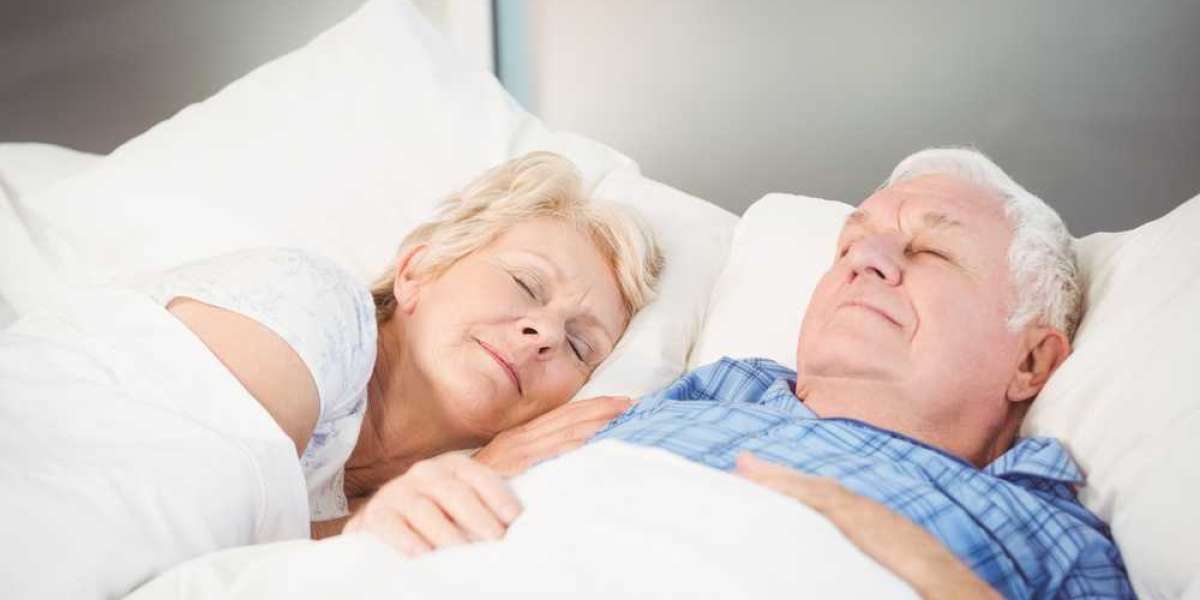Edward has dreaded going to bed at night ever since he retired from his job. Whenever he turns off his light, he's afraid that he'll just lie there with his eyes open and his mind racing. "How can I break free from this cycle?" he wonders. "I'm completely exhausted—I really need to sleep."
You, like Edward, are looking forward to a good night's sleep. Getting enough sleep is important for maintaining your health and alertness. Many older people, on the other hand, have trouble sleeping. If you're constantly tired or find it difficult to get enough sleep at night, it may be time to see a doctor about your condition. Being tired every morning when you wake up is a sign that you are not getting enough sleep.
Sleep and the Process of Aging
On a bed, there is a clock.
Older adults require roughly the same amount of sleep as all other adults—7 to 9 hours per night on average. Older people, on the other hand, have a tendency to go to sleep and wake up earlier than they did when they were younger.
There are a variety of factors that can contribute to older people not getting enough sleep at night. When you are sick or in pain, it can be difficult to fall asleep. Some medications have the potential to keep you awake. Whatever the reason, if you don't get a good night's sleep the next day, you may experience the following symptoms:
Become agitated.
Have memory problems or be prone to forgetting things
You're feeling down.
Have more slips, trips, and falls
You should get a good night's sleep.
Being older does not imply that you must be exhausted all of the time. There are numerous things you can do to aid in your ability to get a good night's sleep. Here are a few suggestions:
Maintain a consistent sleep schedule. Sleep and wake up at the same time every day, even on weekends or while traveling, to maintain a consistent schedule.
If at all possible, avoid taking a nap in the late afternoon or evening. It is possible that napping will keep you awake at night.
Create a bedtime routine that you can stick to. Every night, set aside some time to unwind before bed. Some people relax by reading a book, listening to relaxing music, or taking a warm bath.
Avoid using your computer, cell phone, or tablet in the bedroom, and refrain from watching television. It may be difficult for you to fall asleep if you are exposed to the light from these devices. Additionally, frightening or unsettling television shows or movies, such as horror films, may keep you awake.
Maintain a comfortable temperature in your bedroom that is neither too hot nor too cold, and keep it as quiet as possible.
Low-level lighting should be used in the evenings and as you prepare for bedtime.
Exercise at regular intervals throughout the day, but not within three hours of going to bed.
Large meals should be avoided close to bedtime because they can keep you awake.
Avoid caffeine in the late afternoon and evening. Caffeine (which can be found in coffee, tea, soda, and chocolate) has the ability to make you stay awake.
Keep in mind that alcohol will not assist you in falling asleep. Even small amounts of caffeine make it difficult to sleep.
In older adults, insomnia is a common occurrence.
Insomnia is the most common sleep disorder in adults over the age of 60, according to the National Sleep Foundation. People who suffer from this condition have difficulty falling asleep and remaining asleep. Insomnia can last for a few days, several months, or even several years. If you are having difficulty sleeping, it could mean that you are:
It will take a long time for you to fall asleep.
I woke up several times during the night.
You wake up early in the morning and are unable to fall back asleep.
You are exhausted when you wake up.
During the day, you feel extremely sleepy.
Being unable to sleep becomes a habit for many people. Those who are concerned about not sleeping worry about it even before they get into bed. It may be more difficult to fall asleep and stay asleep as a result of this.
Some older adults who are having difficulty sleeping may turn to over-the-counter sleep aids for assistance. Others may rely on prescription medications to aid them in their sleep. When taken for a short period of time, these medications may be beneficial. But keep in mind that medications are not a cure for insomnia.
Developing healthy bedtime habits may aid in the achievement of a restful night's sleep.
Sleep Apnea is a medical condition that affects the way you sleep.
People who suffer from sleep apnea experience brief pauses in their breathing while they are sleeping. During the course of the night, these pauses may occur multiple times. If left untreated, sleep apnea can lead to a variety of other complications, including high blood pressure, stroke, and memory loss.
You may be suffering from sleep apnea without even realizing it. It is possible that you have sleep apnea if you are sleepy during the day and your partner complains that you sleep loudly while snoring.
If you suspect that you have sleep apnea, consult with a doctor who is experienced in treating this sleep disorder. It is possible that you will need to learn to sleep in a position that allows your airways to remain open. People suffering from sleep apnea almost always benefit from treatment that includes the use of a continuous positive airway pressure (CPAP) device. A dental device or surgical intervention may also be necessary.
Sleep Disorders and Movement Disorders
Patients over the age of 65 are more likely than younger people to suffer from restless legs syndrome, periodic limb movement disorder, and rapid eye movement sleep behavior disorder. These movement disorders can cause you to lose sleep that you require.
People who suffer from restless legs syndrome, also known as RLS, experience tingling, crawling, or pins and needles sensations in one or both legs. This sensation is exacerbated at night. Consult your doctor for more information on medications that can be used to treat RLS.
When people have a condition known as periodic limb movement disorder (PLMD), they jerk and kick their legs every 20 to 40 seconds while they sleep. Medication, warm baths, physical activity, and relaxation exercises can all be beneficial.
Another condition that may make it difficult to get a good night's sleep is rapid eye movement sleep behavior disorder, also known as REM sleep behavior disorder. During normal REM sleep, your muscles are unable to move, resulting in your body remaining motionless. The opposite is true for people who suffer from REM sleep behavior disorder, in which case their muscles can move and their sleep is disrupted.
Alzheimer's Disease and Sleep: A Particularly Difficult Problem
Sleeping patterns are frequently altered in people suffering from Alzheimer's disease. Some people with Alzheimer's disease sleep excessively, whereas others sleep insufficiently. Some people wake up several times during the night, while others wander or yell in the middle of the night.
The person suffering from Alzheimer's disease is not the only one who experiences sleep deprivation. Caregivers may experience sleepless nights, leaving them exhausted and unprepared to face the challenges they face.
You can take the following steps to make your loved one safer and to help you sleep better at night if you are caring for someone with Alzheimer's disease:
Make sure there are no obstructions on the floor.
Any medications should be kept in a safe place.
In the bathroom, install grab bars to help you get up.
Place a gate between the stairwell and the landing.
Sleeping Safely for Older Adults
Make an effort to create a safe and restful sleeping environment. You should make certain that you have smoke alarms installed on each floor of your home. Before going to bed, make sure that all windows and doors that lead outside are closed and locked. Other suggestions for getting a good night's sleep include:
Keep a telephone near your bed with emergency phone numbers programmed into it.
Keep a lamp that is easy to turn on and off within reach.
Keep a glass of water next to your bed in case you wake up thirsty in the middle of the night.
Don't smoke, especially before going to sleep.
Remove any area rugs from the room so that you won't trip if you get out of bed in the middle of the night.
Tips to Assist You in Falling Asleep
It's possible that you've heard of some tricks to help you fall asleep. You are not required to count sheep; however, you could try counting slowly from one to one hundred. It has been observed that playing mental games can cause some people to become sleepy. You could tell yourself, for example, that you have 5 minutes before you have to get up and that you're just trying to get a little more sleep.
It has been observed that some people fall asleep after relaxing their bodies. Consider picturing your toes completely relaxed, followed by your feet completely relaxed, and finally your ankles completely relaxed. Work your way up the rest of your body, section by section, until you reach your shoulders. It is possible that you will fall asleep before reaching the top of your head.
Your bedroom should be used solely for sleeping. You should allow yourself approximately 20 minutes to fall asleep after turning off the lights in your room. Make your way out of bed if you are still awake and not drowsy. When you begin to feel sleepy, return to your bed.
If you've been feeling tired and unable to participate in your normal activities for more than 2 or 3 weeks, you may be suffering from a sleep disorder. Consult your doctor about any changes you can make to your sleeping habits in order to get a better night's sleep.



